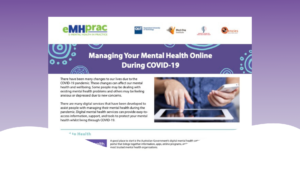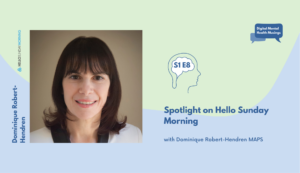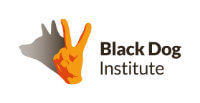Sign up below to receive monthly eMHPrac newsletters and updates about the latest digital mental health news, events, and resources.

eMHPrac would like to wish you a happy new year! The team at eMHPrac looks forward to keeping you up to date with the latest research, the latest digital programs to be released and address your queries regarding the implementation of digital mental health services with your clients.
In 2022, the second season of our podcast, Digital Mental Health Musings, will be released. Dr Ruth Crowther will speak to experts in the field and lead staff of popular evidence-based digital services. eMHPrac will update and expand our growing resource library and will be on the ground, attending conferences to answer your questions and present on digital mental health topics.
This eMHPrac newsletter outlines our “Managing Your Mental Health Online During COVID-19” factsheet and introduces the new MindSpot course – “Things You Do”, which is currently available under a research trial. Our featured service is the Eating Disorders Carers Helpkit, providing online support for those supporting someone with an eating disorder.
In this edition:
- Managing Your Mental Health Online During COVID-19
- *New* MindSpot Clinic Things You Do Course (current research trial)
- Latest eMHPrac Podcast – Episode 8 with Dominique Robert-Hendren
- Upcoming Live Webinar
- See the eMHPrac team at these upcoming conferences
- Read the latest dMH research articles
- This month’s featured service: Eating Disorders Carers Help Kit
Managing Your Mental Health Online During COVID-19

The pandemic has entered a new phase, with reduced restrictions and border openings in some states and territories leading to increased case numbers across Australia. More clients and mental health practitioners are coping with work-from-home arrangements, COVID-related anxiety, an increased risk of being COVID positive, and the potential financial, emotional, and familial consequences.
eMHPrac has developed a Managing Your Mental Health Online During COVID-19 factsheet. This can be utilized as a prescription or handout for clients or kept as a guide to determine appropriate digital tools for clients who are managing distress related to COVID-19 or coping with existing mental health problems through the pandemic.
Listed below is a selection of key digital mental health services providing support with COVID-related issues.
- Head to Health
- A good place to start is the Australian Government’s digital mental health gateway. Head to Health is a searchable portal that brings together information, apps, online programs, online forums, and phone services from Australia’s most trusted mental health organisations.
- Beyond Blue Coronavirus Support Service
- ph: 1800 512 348
- Beyond Blue offers a dedicated Coronavirus mental health support package. Explore the information, advice and strategies prepared to help people manage their mental wellbeing during the pandemic.
- THIS WAY UP
- This Way Up lists free online modules and practical tools for managing mental health during COVID-19. Contains courses on managing self-isolation and self-guided programs for managing a range of mental health problems.
- Drs4Drs
- Drs4Drs was developed by medical professionals to support the health and wellbeing of medical professionals and medical students. Their website connects doctors and medical students across Australia with online resources, finding a GP, and other mental health support. Their confidential telehealth service is available to support doctors and medical students struggling with their mental health.
- TEN
- TEN is an e-hub designed for all health professionals allowing anonymous support, mental health screening and links to resources. TEN offers modules on topics such as managing burnout, obtaining emotional support and offers links to other online mental health services.
- 1800RESPECT
- ph: 1800 737 732
- Phone support and tips for people experiencing domestic, sexual or family violence during COVID-19 and safety planning tips for self-isolation.
- Smiling Mind – Thrive Inside
- Thrive Inside is an initiative to assist people in staying calm and healthy in the physical constraints of their homes, while retaining a healthy mind.
- Queensland Government – Birdie and the Virus
- Series of flipbooks and activities for parents to assist young children in normalizing the COVID-19 virus and adapt to associated changes. Available in multiple languages.
*New* MindSpot Clinic: Things You Do Course
Current Research Trial

The MindSpot Clinic is free, national support service providing mental health screening and treatment courses. They currently offer programs on managing worry, stress, anxiety and low mood for adults and older adults, managing depression and anxiety for young adults and Indigneous Australians, PTSD, OCD, and chronic pain.
MindSpot have just launch a new 4-week treatment program to help adults self-manage symptoms of depression and anxiety. The Things You Do course is a free, confidential course to support people to do everyday activities which can support their psychological health. The types of activities include; healthy thinking, meaningful activities, setting goals, good routines, and socializing. This course was designed for Australian adults experiencing symptoms of low mood, social anxiety, panic attacks or excessive worry.
Things You Do is currently being provided as part of a clinical research trial. As such, in addition to receiving a treatment guide, some participants will be randomly selected to receive daily wellbeing reminders via text to support them through the course.
Check out the new course here: https://mindspot.org.au/things-you-do
Did you catch the latest episode of the eMHPrac Podcast?
Ep.8 – Spotlight on Hello Sunday Morning

In episode 8, Dr. Ruth Crowther speaks to Dominique Robert-Hendren about Hello Sunday Morning, the Daybreak app, alcohol use, and the drinking culture in Australia. They discuss alcohol use during the festive season and the future of Hello Sunday Morning.
Dominique is a clinical psychologist with extensive experience as a clinician and mental health executive. She was the National Mental Health Program and Services Director for Australia’s largest private health care organization. This was responsible for driving the transformation in service design of evidence-informed innovative programs and new models of care, including an effective national digital mental health care strategy during COVID-19 for both patients and employees. Dominique is a behavioural health scientist, psychology board-approved clinical supervisor and published author. She holds membership on several national committees and is a national keynote speaker on psychological safety, trauma-informed care, Alcohol Use Disorder and workplace mental health and wellbeing.
Ruth and Dominique discuss drinking habits in Australia and changes to the Australian drinking culture, the Daybreak app, its beginnings, development, and benefits to users, and insights about how people use the app. They also discuss the future of Hello Sunday Morning, what projects they have in development and alcohol use during the festive season.
You can also access Digital Mental Health Musings on Soundcloud, Apple Podcasts, Spotify, Google Podcasts, Amazon Music, and Deezer.
Upcoming Black Dog Institute Live Webinar
Webinar 52 | Digital Safety Planning for Suicide Prevention

Tue 22nd February 1:00pm (Australia/Sydney)
Tue 22nd February 8:00pm (Australia/Sydney)
Safety planning is a brief, customisable intervention for the prevention of suicide that can be delivered digitally. It involves collaborating with the person at risk to develop coping strategies and identify professional and social supports that can be accessed, if a suicide crisis emerges. However, the effectiveness of safety plans depends on therapeutic alliance and a solid understanding of what makes a quality, personalised plan. This webinar will provide person-centred training on how to develop effective safety plans with clients and patients.
Learning Objectives
- Describe the steps of the Safety Planning Intervention (SPI), an evidence-based brief intervention for mitigating suicide risk
- Explain and introduce the concept of safety planning to clients and patients
- Demonstrate how a client can create a safety plan using an app on their smartphone and share it with trusted contacts
- Collaborate with clients and patients to create personalised, specific entries for each step of the safety plan
- Identify the elements of a high-quality safety plan, and barriers/enablers for use
- Explain the evidence base supporting safety plans, including potential mechanisms for its effectiveness

Catch us at these upcoming conferences

International Mental Health Conference
31 January – 2 February 2022, Online
The International Mental Health Conference is designed for professionals, workers and volunteers to learn best practice, grow meaningful connections and implement real solutions to mental health care. Over three days of presentations, practical workshops, networking functions, live streaming opportunities and an interactive exhibitor hall, participants will be able to collaborate with international mental health leaders, gain practical tools and unite to advocate for equal mental health care for all individuals.
eMHPrac Director Heidi Sturk is among the International Mental Health Conference Program Committee this year, and is presenting on bridging the divide between practitioner and consumer use of digital mental health. You can also find the eMHPrac team at our virtual trade exhibit and pick up some of our resources.
To register for the conference or view the program, click the link below:
On our reading radar
A randomized trial of online single-session interventions for adolescent depression during COVID-19
Schleider, J.L., Mullarkey, M.C., Fox, K.R. et al. A randomized trial of online single-session interventions for adolescent depression during COVID-19. Nat Hum Behav (2021). https://doi.org/10.1038/s41562-021-01235-0
“The COVID-19 pandemic has potentially increased the risk for adolescent depression. Even pre-pandemic, <50% of youth with depression accessed care, highlighting needs for accessible interventions. Accordingly, this randomized controlled trial (ClinicalTrials.gov: NCT04634903) tested online single-session interventions (SSIs) during COVID-19 in adolescents with elevated depression symptoms (N = 2,452, ages 13–16). Adolescents from all 50 US states, recruited via social media, were randomized to one of three SSIs: a behavioural activation SSI, an SSI teaching that traits are malleable and a supportive control. We tested each SSI’s effects on post-intervention outcomes (hopelessness and agency) and three-month outcomes (depression, hopelessness, agency, generalized anxiety, COVID-19-related trauma and restrictive eating). Compared with the control, both active SSIs reduced three-month depressive symptoms (Cohen’s d = 0.18), decreased post-intervention and three-month hopelessness (d = 0.16–0.28), increased post-intervention agency (d = 0.15–0.31) and reduced three-month restrictive eating (d = 0.12–17). Several differences between active SSIs emerged. These results confirm the utility of free-of-charge, online SSIs for high-symptom adolescents, even in the high-stress COVID-19 context.”
Liverpool S, Mota C, Sales C, Čuš A, Carletto S, Hancheva C, Sousa S, Cerón S, Moreno-Peral P, Pietrabissa G, Moltrecht B, Ulberg R, Ferreira N, Edbrooke-Childs J Engaging Children and Young People in Digital Mental Health Interventions: Systematic Review of Modes of Delivery, Facilitators, and Barriers
J Med Internet Res 2020;22(6):e16317 URL: https://www.jmir.org/2020/6/e16317 DOI: 10.2196/16317
“Background:There is a high prevalence of children and young people (CYP) experiencing mental health (MH) problems. Owing to accessibility, affordability, and scalability, an increasing number of digital health interventions (DHIs) have been developed and incorporated into MH treatment. Studies have shown the potential of DHIs to improve MH outcomes. However, the modes of delivery used to engage CYP in digital MH interventions may differ, with implications for the extent to which findings pertain to the level of engagement with the DHI. Knowledge of the various modalities could aid in the development of interventions that are acceptable and feasible.
Objective:This review aimed to (1) identify modes of delivery used in CYP digital MH interventions, (2) explore influencing factors to usage and implementation, and (3) investigate ways in which the interventions have been evaluated and whether CYP engage in DHIs.
Methods:A literature search was performed in the Cochrane Library, Excerpta Medica dataBASE (EMBASE), Medical Literature Analysis and Retrieval System Online (MEDLINE), and PsycINFO databases using 3 key concepts “child and adolescent mental health,” “digital intervention,” and “engagement.” Preferred Reporting Items for Systematic Reviews and Meta-Analyses guidelines were followed using rigorous inclusion criteria and screening by at least two reviewers. The selected articles were assessed for quality using the mixed methods appraisal tool, and data were extracted to address the review aims. Data aggregation and synthesis were conducted and presented as descriptive numerical summaries and a narrative synthesis, respectively.
Results:This study identified 6 modes of delivery from 83 articles and 71 interventions for engaging CYP: (1) websites, (2) games and computer-assisted programs, (3) apps, (4) robots and digital devices, (5) virtual reality, and (6) mobile text messaging. Overall, 2 themes emerged highlighting intervention-specific and person-specific barriers and facilitators to CYP’s engagement. These themes encompassed factors such as suitability, usability, and acceptability of the DHIs and motivation, capability, and opportunity for the CYP using DHIs. The literature highlighted that CYP prefer DHIs with features such as videos, limited text, ability to personalize, ability to connect with others, and options to receive text message reminders. The findings of this review suggest a high average retention rate of 79% in studies involving various DHIs.
Conclusions:The development of DHIs is increasing and may be of interest to CYP, particularly in the area of MH treatment. With continuous technological advancements, it is important to know which modalities may increase engagement and help CYP who are facing MH problems. This review identified the existing modalities and highlighted the influencing factors from the perspective of CYP. This knowledge provides information that can be used to design and evaluate new interventions and offers important theoretical insights into how and why CYP engage in DHIs.”
This edition’s featured service…

Eating Disorders Carers Help Kit
The Eating Disorders Carers Help Kit was designed for carers, providing resources and community to those living with an Eating Disorder, and detailed information on supporting someone with an eating disorder.
About the Eating Disorders Carers Help Kit
The Eating Disorders Carers Help Kit was developed by Eating Disorders Queensland to provide carers with improved access to information and resources, strengthen their knowledge and skills, improve the carer support community, increase understanding of eating disorders, and improve understanding of the importance of carers in supporting adults with eating disorders. They provide information about eating disorders, treatment options, and how to support someone.
The Eating Disorders Carers Help Kit website includes:
- Quick tips: tips and general information of carers.
- Videos: video playlists, often detailing others’ lived experiences.
- Additional Readings: informative and insightful articles collected by the eating disorders carer help kit.
- Media: a collection of convenient articles, videos and podcasts featured throughout the website
- Downloads: publications, papers and booklets as downloadable PDFs representing the latest knowledge in short, manageable documents, including Eating Disorders booklets.
- Publications: information on a selection of recommended published books for carers, and links on where to buy them from EDQ, or via third party online sellers.
- Reach Out: help for any carers in need of assistance or interested in eating disorder services.
Who is the Eating Disorders Carers Help Kit for?
The Eating Disorders Carers Help Kit is for carers supporting individuals with eating disorders. This includes parents, siblings, partners, friends, grandparents, health professionals, school counsellors, chaplains or any other significant people.
Is there a cost to use the Eating Disorders Carers Help Kit?
There is no cost to use the Eating Disorders Carers Kelp Kit.
How to access the Eating Disorders Carers Help Kit
The Eating Disorders Carer Help Kit can be accessed online at https://eatingdisorderscarerhelpkit.com.au/.





